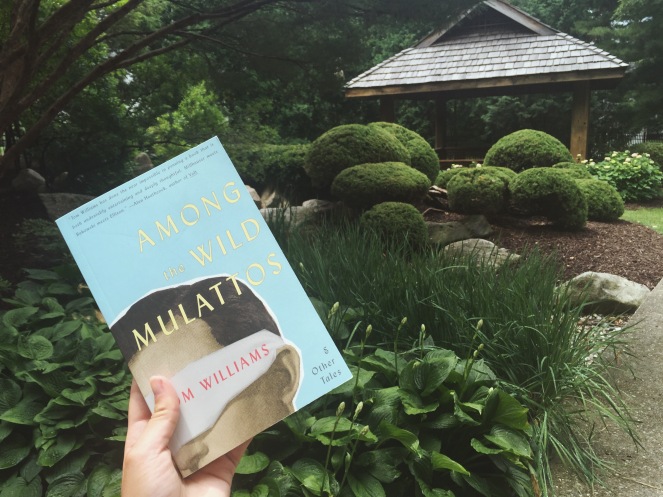[This post is the sixth in a six-part series of Book Reviews of books by some of our 2016 Midwest Writers faculty. The MWW interns wrote the reviews as one of their assignments for the Ball State University class “Literary Citizenship in a Digital Age,” taught by MWW Director Jama Kehoe Bigger.]
Among the Wild Mulattos & Other Tales: Thinking Outside the Two Box
Among the Wild Mulattos & Other Tales by Tom Williams begins with the “The Story of My Novel, Three Piece Drink With Combo.” Cut to a painfully oblivious author reading rejection letters from the magazines Random Acts of Prose, Amateur Writers Unite!, and Boning the Muse. While he’s contemplating ending his writing career to become a full-time manager at Delta Lanes Bowling Alley, he’s eating chicken at Cousin Luther’s, a fast-food chicken establishment. Then, inspiration strikes. He is suddenly compelled to eternize what a work of art his three piece drink with combo truly is. He requests, and is granted, sponsorship and publication by the fast-food chain itself and begins to write his novel. In three months he writes the novel, mostly subsisting on Cousin Luther’s chicken. The tale ends, as most of Williams do, in search of fulfillment.
In this collection of tales, Williams forces the reader to accept realities with minor adjustments: fast-food publishing houses, a television crazed nation where every citizen but one has appeared on reality TV, popular writers using celebrity look-alikes for publicity, doppelgangers that slowly steal lives away from their counterparts, and secret group of mulattos living the woods of Arkansas. The characters that William’s creates are so vivid and complex, their shortcomings in plain sight. While Williams creates relatable characters, he also paints the shortcomings of the reader.
His tales are compact and succinct. You will not find flowery descriptions that bloom off the page. In small stories and plain words, you will find vulnerability that possibly no one else but Williams could articulate so gently. You will be confronted with the micro-aggressions of living a multi-racial life while feeling very macro-emotions.
Williams also explores the array of choices between and outside of binary options. In his tale “The Hotel Joseph Conrad,” a man has been given funding to find the elusive Hotel Joseph Conrad. Ultimately, he discovers his two options aren’t simply to find the hotel or not find it, he finds the solution in the nuance of his contract to search for the hotel. Regardless of the length and where the characters are in their lives, the tales always end with a deep sense of completion and intelligence.
“Among the Wild Mulattos,” the final tale and the namesake for the collection, is one of the most profound and lasting tales. An anthropologist begins searching for, and subsequently finds, a band of wild mulattos that are rumored to be living in the woods of Arkansas. The colony refers to the outside world as Two Box, as in the two boxes that one must identify with on clerical forms, white or black. Williams writes so viscerally about the experiences of living in a culturally ambiguous body.
A mulatto in Two Box was subject to the worst kind of stupidity and intolerance from all sides. For every Anglo like my uncle who pretended I didn’t exist so he wouldn’t have to admit his niece had had intercourse with a black man, there was a black man who sneered when I tried to find solidarity with him.
Throughout his entire collection, and glaringly so in this tale, Williams grapples with the complexity of identity and race. He presents readers with the impossibility of choice when a person is only given two boxes to express the entirety of a nuanced identity. He explores the choices of black or white, and skin color serves to make characters blend in or stand out, sometimes oscillating between the two. His light and whimsical style of writing is not meant to be taken lightly though, he discusses the very real and limiting state of contemporary social politics.




